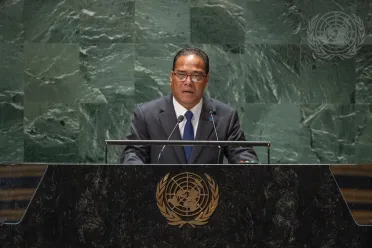Statement
Statement summary
WESLEY SIMINA, President of the Federated States of Micronesia, recalling that the 2015 Paris Agreement is a key tool to combat the climate crisis, he lamented that the international community has not done enough to limit the rise in global temperature to 1.5°C or less. Loss and damage caused by the climate crisis are accumulating in Micronesia every day, he stressed, encouraging those present to use the Montreal Protocol on Substances that Deplete the Ozone Layer as a model for a new agreement on methane. He also implored all parties to the Paris Agreement — particularly major emitters from the developed and developing world — to commit to emissions reductions of at least half by 2030 and peg their net-zero goals no later than 2050. Countries should eliminate methane and hydrofluorocarbon emissions, as well as other short-lived climate pollutants, from their industrial products and activities, he stated, noting that this could reduce global warming by at least a 0.5°C.
Although Micronesia has negligible global emissions, it aims to reduce carbon dioxide emissions from electricity generation by more than 65 per cent by 2030 through its nationally determined contributions strategy. “By 2050 Micronesia will achieve net zero,” he spotlighted, while also calling for the operationalization of the new loss and damage fund at the 28th United Nations Climate Change Conference. In addition, the Government has adopted a constitutional amendment to recognize the right of people to a healthy environment, he reported, also highlighting that it has joined others in requesting the International Criminal Court’s advisory opinion on the obligations of States in relation to climate change. “Countries like mine, and people like mine, are at the front lines of climate change,” he underscored, adding that the resilience of these countries is not a placeholder for continued inaction.
He went on to recall that Micronesia and other small island developing States, particularly from the Pacific, have advocated for the inclusion of Sustainable Development Goal 14 (conservation and sustainable use of oceans) in the 2030 Agenda, while also spotlighting their contributions to the adoption of the Treaty on Marine Biodiversity of Areas Beyond National Jurisdiction (BBNJ). “I am honoured to have been the first Head of State to sign the BBNJ Agreement,” he stressed. He also pointed out that through “Micronesia Challenge” and “Blue Prosperity Micronesia” the country is working towards establishing marine protected areas. “Micronesia is a proud matrilineal society, where our clans, lineage and land control are mainly passed down from generation to generation through women,” he continued, highlighting the increase of female members in its national congress.
Reiterating his country’s solidarity with Ukraine, he urged all Member States to cooperate in addressing the impacts of the war in that country on food security, energy and finance, particularly on small island developing States. “We must find ways to put an end to this illegal war,” he underscored. Turning to Security Council reform, he said that permanent membership must be expanded to Japan, India, Germany and others, while non-permanent membership should include a stand-alone seat for small island developing States. Underlining that these changes are needed to enhance the organ’s legitimacy, credibility and effectiveness, he emphasized: “The time for Security Council reform is now.”
Wesley Simina President of the Federated States of Micronesia emphasized the Paris Agreement as a critical tool for addressing the climate crisis, although the current commitments under the agreement were insufficient to limit global warming to 1.5°C, a target crucial for small island nations like Micronesia.
Full statement
Read the full statement, in PDF format.
Photo

Previous sessions
Access the statements from previous sessions.
